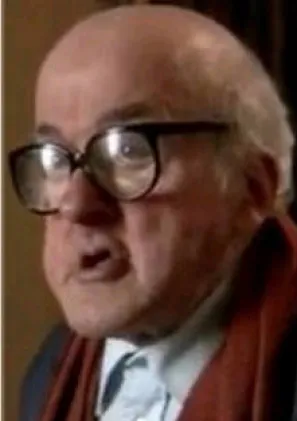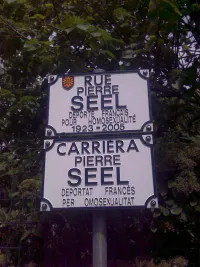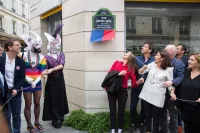Biography
1923 - 2005
“I had to bear witness in order to protect the future, bear witness in order to overcome the amnesia of my contemporaries.”
– Pierre Seel
By his late teens, Pierre Seel knew he was gay. In 1939, while in a public garden notorious for cruising, his watch was stolen. When he reported the theft to police, he unknowingly added his name to a list of known homosexuals. After the German invasion in May 1941, Seel was arrested by the SS, beaten, jailed and transferred to the Schirmeck-Vorbruck camp, where he worked as a slave laborer to build crematoriums. His treatment there was marked by starvation, rape, and torture – he was even made to suffer being impaled with syringes thrown at him like darts. On the order of camp authorities, he was also forced to watch as his boyfriend, Jo, was stripped naked, bound, and torn to shreds by dogs. In November 1941, Seel was released from the camp only to be conscripted to the German army. After four years he deserted and surrendered to the Allies. Because liberation had come for some, but not for homosexuals, he fabricated a story regarding his deportation. It was a decision all the gay victims of the Third Reich were forced to make because the society into which they were released was no less homophobic than it was before the war. In 1950 Seel married and eventually fathered three children. Deeply closeted, his despair led to alcoholism and eventual estrangement from his family. In 1982, when a French bishop railed against homosexuals, Seel broke his silence and reclaimed his identity as a gay man by telling of the horrors he had endured. He spent the rest of his life demanding recognition for the forgotten French victims of the Nazis’ anti-homosexual policies. In 1994 he published I, Pierre Seel, Deported Homosexual and appeared on TV, in the press, and in the documentary ‘Paragraph 175’ (2000). He remains the only French person to testify openly about being deported during WWII because of his homosexuality. He spent the last twelve years of his life with his partner, Eric Feliu, in Toulouse, France. He died from cancer in their home on November, 25, 2005. He was 82.
1923 - 2005
“I had to bear witness in order to protect the future, bear witness in order to overcome the amnesia of my contemporaries.”
– Pierre Seel
By his late teens, Pierre Seel knew he was gay. In 1939, while in a public garden notorious for cruising, his watch was stolen. When he reported the theft to police, he unknowingly added his name to a list of known homosexuals. After the German invasion in May 1941, Seel was arrested by the SS, beaten, jailed and transferred to the Schirmeck-Vorbruck camp, where he worked as a slave laborer to build crematoriums. His treatment there was marked by starvation, rape, and torture – he was even made to suffer being impaled with syringes thrown at him like darts. On the order of camp authorities, he was also forced to watch as his boyfriend, Jo, was stripped naked, bound, and torn to shreds by dogs. In November 1941, Seel was released from the camp only to be conscripted to the German army. After four years he deserted and surrendered to the Allies. Because liberation had come for some, but not for homosexuals, he fabricated a story regarding his deportation. It was a decision all the gay victims of the Third Reich were forced to make because the society into which they were released was no less homophobic than it was before the war. In 1950 Seel married and eventually fathered three children. Deeply closeted, his despair led to alcoholism and eventual estrangement from his family. In 1982, when a French bishop railed against homosexuals, Seel broke his silence and reclaimed his identity as a gay man by telling of the horrors he had endured. He spent the rest of his life demanding recognition for the forgotten French victims of the Nazis’ anti-homosexual policies. In 1994 he published I, Pierre Seel, Deported Homosexual and appeared on TV, in the press, and in the documentary ‘Paragraph 175’ (2000). He remains the only French person to testify openly about being deported during WWII because of his homosexuality. He spent the last twelve years of his life with his partner, Eric Feliu, in Toulouse, France. He died from cancer in their home on November, 25, 2005. He was 82.
Demography
Demography
Gender Male
Sexual Orientation Gay
Gender Identity Cisgender
Ethnicity Caucasian/White
Faith Construct Catholic
Nations Affiliated France Germany
Era/Epoch World War II (1939-1945)
Field(s) of Contribution
Author
Military
Social Justice
Commemorations & Honors
Featured in the Paragraph 175 Documentary (2000)
Plaque Commemorating Toulouse Renaming City Street in Pierre Seel’s Honor (2008)
Paris Street Named After Pierre Seel (2019)
Demography
Gender Male
Sexual Orientation Gay
Gender Identity Cisgender
Ethnicity Caucasian/White
Faith Construct Catholic
Nations Affiliated France Germany
Era/Epoch World War II (1939-1945)
Field(s) of Contribution
Author
Military
Social Justice
Commemorations & Honors
Featured in the Paragraph 175 Documentary (2000)
Plaque Commemorating Toulouse Renaming City Street in Pierre Seel’s Honor (2008)
Paris Street Named After Pierre Seel (2019)
Resources
Resources
Harrison, Eric. "'Paragraph 175' Examines German Atrocities Targeting Gays." Houston Chronicle (May 18, 2001): Houston, 4.
Seel, Pierre. I, Pierre Seel, Deported Homosexual: A Memoir of Nazi Terror. Joachim Neugroschel, trans. New York: BasicBooks, 1995.
http://en.wikipedia.org/wiki/Pierre_Seel
http://www.washingtonpost.com/wp-dyn/content/article/2005/12/01/AR2005120101637.html
http://www.fordham.edu/halsall/pwh/seel.asp
https://www.hmd.org.uk/resource/pierre-seel/
https://www.npr.org/templates/story/story.php?storyId=5036618
https://www.history.com/news/pink-triangle-nazi-concentration-camps
Resources
Harrison, Eric. "'Paragraph 175' Examines German Atrocities Targeting Gays." Houston Chronicle (May 18, 2001): Houston, 4.
Seel, Pierre. I, Pierre Seel, Deported Homosexual: A Memoir of Nazi Terror. Joachim Neugroschel, trans. New York: BasicBooks, 1995.
http://en.wikipedia.org/wiki/Pierre_Seel
http://www.washingtonpost.com/wp-dyn/content/article/2005/12/01/AR2005120101637.html
http://www.fordham.edu/halsall/pwh/seel.asp
https://www.hmd.org.uk/resource/pierre-seel/
https://www.npr.org/templates/story/story.php?storyId=5036618
https://www.history.com/news/pink-triangle-nazi-concentration-camps





